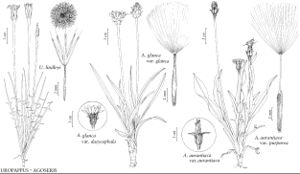Uropappus
Trans. Amer. Philos. Soc., n. s. 7: 424. 1841.
Annuals, 5–70 cm (sometimes acaulescent, glabrous or lightly farinose, usually white-villous proximally); taprooted. Stems 1–5+, erect, sometimes well branched proximally (internodes 0.3–6 cm, or plants acaulescent). Leaves all or mostly basal; obscurely petiolate; blades (often reddish or purplish), linear or narrowly lanceolate, (bases ± clasping) margins entire or remotely, pinnately lobed or dentate (white-villous-ciliate proximally, apices acuminate, faces glabrous or crisped white-villous throughout). Heads borne singly (erect). Peduncles (erect from bud to mature fruit) inflated distally, ebracteate. Calyculi 0. Involucres fusiform to ovoid, 3–15 mm diam. Phyllaries 5–26 in 3–4 series, lanceolate, unequal (outer shorter, inner equal), margins scarious, apices long-tapering, acute, faces glabrous. Receptacles flat or convex, pitted, glabrous, epaleate. Florets 5–150; corollas pale-yellow, usually reddish abaxially. Cypselae usually black or dark-brown, rarely gray (outer sometimes paler), ± columnar to fusiform, often narrowed distally to relatively short beaks, ribs 10, minutely scabrous, hispidulous; pappi falling, of 5, distinct, white, lustrous, lanceolate, aristate scales (apices notched, aristae smooth). x = 9.
Distribution
w North America, nw Mexico
Discussion
Species 1.
Uropappus lindleyi was placed in Microseris (K. L. Chambers 1955) because of two allotetraploid species formed by hybridization with annual members of that genus. A number of morphologic features, including narrow, acuminate leaves with villous-ciliate margins, erect heads, relatively long outer phyllaries, cypselae often short-beaked, and pappi of white, lustrous scales suggest a connection with Nothocalaïs, especially N. troximoides. Phylogenetic studies of chloroplast DNA variation (R. K. Jansen et al. 1991b; J. Whitton et al. 1995) link Uropappus with Nothocalaïs and Agoseris as a sister clade to Microseris. Consequently, Jansen et al. separated Uropappus from Microseris and placed the two allotetraploid species in Stebbinsoseris.
Selected References
Lower Taxa
"fine" is not a number.
